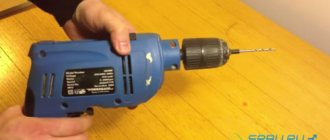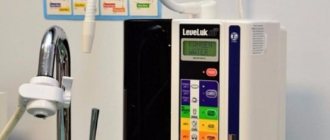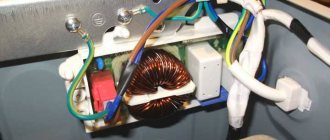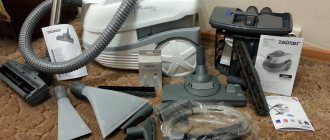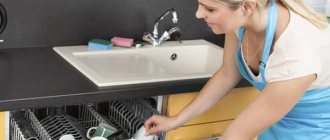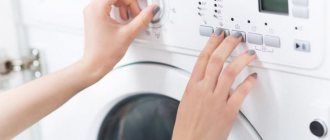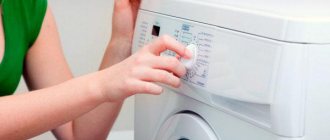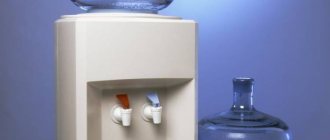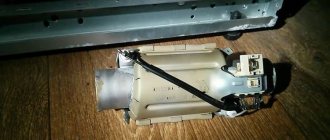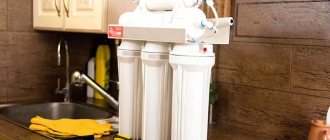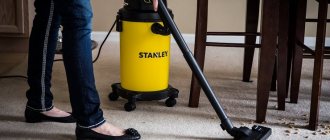The essence of the process
It all depends on the concentration of various impurities. The higher the content of calcium, magnesium, and other alkaline earth metals, the less soft the liquid that comes out of your tap will be. The number of such elements directly depends on the source. The deeper the deposit, the higher the likelihood of excessive salt enrichment as fluid passes through the limestone strata. In small doses they do not harm the human body. However, exceeding acceptable levels can have a negative impact on people’s well-being.
It is worth paying attention to seasonal changes. In late spring, when the snow melts, the moisture becomes softer. Pay attention to this when taking measurements. To objectively assess the maximum degree of salt concentration, take measurements in winter. If a high-quality filter is installed to soften the hardness of water from a well in a private house or cottage, then such problems will not worry you.
How and why to measure water hardness
The need for constant monitoring of liquid parameters is due to the negative impact of the minerals it contains on human health and the operation of electrical appliances. Hardness measurement is carried out in domestic and industrial conditions. For this you can use special devices.
Hardness is determined by the amount of magnesium and calcium ions; units of change – mEq/l. To find out the level of hardness of the transported liquid, indicate the number of magnesium or calcium ions in 1 liter of water. It is impossible to determine the value of this parameter yourself.
There are generally accepted standards that are regulated by GOST 31865-2012. Thus, a level of no higher than 7 mEq/L is considered acceptable. Water with this hardness level can be used for drinking.
To measure hardness, you can use a special device.
Separate filters for softening well water sometimes provide hardness of up to 10 mEq/l. This is an acceptable value, but only in certain cases. To find out under what conditions such water can be used, regulatory documentation is studied.
In everyday life, an increase in hardness to 5 mEq/l is immediately felt: scale begins to form on the heating element, white marks remain on the metal sink, and a thin film appears on the brewed tea.
If there is free time, water samples are taken to the laboratory to obtain results on the level of hardness.
A simple way to check water hardness level
Simpler ways to determine this parameter:
- special test strips are used (they can be purchased at home appliance stores, coffee machines) - when using such a product, a change in the material of the tester is noted due to contact with water of increased hardness;
- You can do a simple experiment.
To sell the latter, you will need laundry soap (72%), distilled water, a glass container, scales, and a measuring container. Instructions:
- Take 1 gram of soap (scales are used to measure the exact amount).
- Distilled water is heated, but not brought to a boil.
- Combine the liquid and soap (the latter should dissolve).
- Add distilled water to the container (to a level of 7 cm above the bottom).
- Prepare 0.5 liters of cold water. Pour a soap solution into it and mix; this creates foam. To determine hardness, you need to measure the height of the solution that is below the foam. 1 cm binds in 0.5 liters of water the amount of salts corresponding to 2°dH. If 4 cm of soap solution was added to obtain foam, then the hardness is 8°dH.
Why do we need special devices?
Liquid from any source contains salt fractions in varying quantities. The minimum values of this parameter mean a soft liquid. At maximum rates, we are already talking about the super-hard and most harmful variety. When consumed either in its pure form or for cooking, it can have negative health consequences. We will tell you more about this in the corresponding section of the article. A well-chosen filter for softening tap water helps avoid such problems.
In addition to preventive and medical advantages, installing a filtration system also solves other important problems:
- The consumption of cleaning agents and detergents is reduced.
- Cooked food tastes better.
- Limescale deposits practically do not form on tiles and other surfaces.
- Appliances (washing machine, dishwasher, kettle, etc.) last much longer and are less likely to fail due to breakdowns.
Much more consequences can be cited. After all, all the relationships between different home areas are difficult to trace. Therefore, we recommend that you take care of installing cleaning devices in advance.
Membrane water filters for sinks
Geyser uses two types of membranes in household filters:
- reverse osmosis;
- nanofiltration.
They differ in the size of the pores that trap pollutants in their body. The first membranes have a pore size of 0.0001 microns or 0.1 nm and allow virtually only H2O molecules to pass through; the second, in addition, leave a small amount of hardness salts in clean water and thereby optimize the mineral composition.
The line of reverse osmosis filters includes the following models:
- “Geyser Prestige” series (“Prestige”, “Prestige M”, “Prestige P”, “Prestige PM”),
- "Geyser Prestige 2"
- "Geyser Allegro".
The Geyser Nanotek water purifier is equipped with a nanofiltration membrane.
Purpose of filters for softening water from a well in a private house
The main purpose of special filtration devices is to remove impurities. Depending on the source, volume of use, and other parameters, the optimal cleaning mechanism is selected. At the moment, there are many types of devices that properly perform their functions at various objects. It is difficult to overestimate the benefits of installing good equipment. Firstly, the risk of development and progression of diseases in people with diseases of the gastrointestinal tract is reduced. Secondly, the harmful effects of salts on the kidneys and joints are reduced (especially important for older people). Thirdly, the service life of household appliances and utility networks increases.
Filters for reducing water hardness: features of use
It is very important to provide private housing with a modern means of filtering the water supply. Especially if among the residents there are people with particularly sensitive skin and allergies. For them, a comfortable life is simply impossible without such devices.
Many people mistakenly believe that the problem can be solved using alternative methods. Boiling, adding chemicals - all these are ineffective and extremely inconvenient methods. The features and advantages of using special equipment are as follows:
- No large storage tanks required.
- Maintenance during operation does not take much time.
- A liquid in which there are no natural salts left can also be harmful to the body. In particular, it causes complications in patients with cardiovascular diseases. Fine-tuning the cleaning level of professional systems prevents excessive leaching of minerals.
It is worth noting that there is no universal technique that is ideal for any conditions. A thorough analysis and consultation with specialists will allow you to find the ideal option just for you.
What are the types of main water softener filters?
We offer various products, all of them differ in:
- degree of purification;
- dimensions;
- design features (case material);
- brand;
- throughput and other characteristics.
But we consider the main difference to be the filtration technology used.
Water softening occurs using the following types:
- Ion exchange is considered the most effective technology. Special ion exchange resins (cation exchangers) are used here.
- Magnetic activators – suitable for process water. Less effective than the first, however, it is in demand since the cost is much lower.
- Polyphosphate filters are a flask in which sodium polyphosphate is poured. It dissolves in water, thereby neutralizing hardness salts. It is worth noting that it only applies to washing machines. It is highly not recommended to use it on a public highway or for drinking purposes.
There is a fourth method, which is not practiced in Russia because it is considered very expensive and dangerous - this is the dosage of carbon dioxide.
Degrees of hardness-softness
Before answering the question of which filter to soften water, you need to understand what we will soften. The water classification includes:
- Soft. Very rare. Such aquifers are located very deep. Production wells are usually called artesian wells.
- Average. Typically found in homes with a central supply where softeners are installed on the water line.
- Typically found in homes with a central supply where softeners are installed on the water line.
- Super tough. Unfortunately, in most private homes with individual wells this is exactly the liquid. It may also be a consequence of the wrong choice of water field. This means an extremely unacceptable amount of impurities for most people.
Filters for softening hard water: principles of operation
At the moment, quite a lot of productive methods have been invented to achieve the desired result. Some cleaners simply remove the required amount of calcium/magnesium. In another case, the cations of these elements are replaced with safer components. All these manipulations can be performed using both classical membrane methods and more advanced means. Today, no one can be surprised by a magnetic, electromagnetic, or ultrasonic cleaner. We will tell you more about each type below.
MBFT-75 Membrane for 75GPD
SF-mix Clack up to 0.8 m3/h
SF-mix Runxin up to 0.8 m3/h
Dangers of high salt concentrations
If a hard water filter is not installed, the consequences may be as follows:
- health problems, increased load on the kidneys;
- possible problems with teeth;
- the consumption of detergents (soap, powder, etc.) increases significantly;
- joints suffer from excessive salt deposits;
- clothes wear out much faster;
- it becomes difficult to care for your hair; washing and combing it is quite difficult;
- food has a strange taste;
- plumbing fixtures and tiles become covered with a layer of plaque almost immediately after cleaning;
- stains constantly form on dishes and kitchen utensils;
- household appliances break down.
Electromagnetic filter systems
Electromagnetic filters are devices in a plastic case with a built-in microprocessor. It emits electromagnetic waves of a certain frequency. The vibrations are transmitted through special wires, the ends of which are wound onto pipes in front of household appliances, protected from the effects of hard water.
Features of using the filter:
- Under its influence, the already deposited scale disintegrates over time.
- The cleaning device can be installed on a clean pipe made of any material.
- An electromagnetic filter for water of increased hardness is connected to the electrical network. During operation, it consumes a small amount of electricity. But the device does not require cartridge replacement.
Important! Under the influence of the filter, the physical and chemical properties of drinking water do not change, i.e. it contains exactly the same amount of impurities, but they cannot be deposited in the form of scale.
Electromagnetic devices are the most expensive of all, but also the most effective. They can also be used in conjunction with other filters.
USEFUL INFORMATION: GKL or GVL, which is better: differences, what is the difference, what to choose?
Kinds
The main differences between different devices are the cleaning mechanism. The methods differ significantly from each other. In each specific case, a certain type will be most suitable. But water purification systems from hardness also have different dimensions, tank volumes, technical characteristics, and their own installation specifics. Let's talk in more detail about the most popular samples.
Ion exchange
The filter element of this type consists of a layer of sodium cation exchange resin (ion exchange resin). The liquid passed through this substance loses most of the impurities that settle in the resin layer. The effect is achieved by replacing some ions with others. Reaching the bottom of the container, the purified stream rises through a special tube, completely ready for use. The design includes a backwash mechanism and a container for regeneration solution.
pros
- Great service life.
- Simplicity of design and reliability.
- Does not depend on the pressure level in the system.
- Versatility and possibility of installation on domestic and industrial facilities.
- Fast cleaning process using the flow method.
- There is no need to install storage tanks.
Minuses
- Ineffective when working with hot water supply.
- Requires maintenance and cleaning of the filter layer at certain intervals.
Polyphosphate
These hard water softener filters use crystallized polyphosphate salt as the filtration agent. As in the previous case, the principle of operation is quite simple. Passing through the salt layer, the liquid loses some of its properties. A series of chemical reactions successfully softens medium and hard compositions, forming a protective film that prevents the formation of scale.
The scope of application of this technology is limited to household appliances. Thanks to the installation of such a system, the equipment will last much longer. This modification is not suitable for cooking and direct consumption. Often there is parallel installation of polyphosphate equipment and other varieties. The device is unpretentious in maintenance. It is recommended to change the filler once every six months. A clear advantage is working with hot water supply.
Membrane
Unfortunately, it’s worth mentioning right away about the disadvantages of this filter for purifying hard water from a well. It removes dirt and impurities very effectively, but it also destroys minerals. The output is a distilled liquid. When operating in buildings with a central pipeline, this is perhaps the best option. However, additional mineralization of the over-refined distillate may be required. Another disadvantage is the rather high cost and limited pressure range in the system (up to 4 atmospheres).
Mechanisms of membrane purifiers
The mechanism consists of several reservoirs:
AMETHYST - 02 M Residential building for up to 10 people or up to 2 cubic meters/day.
Aeration unit AS-1054 VO-90
Main table dispenser AquaPro 919H/RO (hot and cold water)
- The first retains large fractions: sand, rust, scale, and other particles.
- Carbon filtration in the second section removes chlorine-containing elements.
- The remaining organic particles settle in the third container.
After this, a mineralizer and a storage tank for the purified product can optionally be installed.
Magnetic
Suitable for installation on a cold main. It has the simplest design of the examples we are considering. The device is simply installed on top of the pipe, and its magnetic properties affect the physical and chemical properties of the liquid, softening it. Purification of hard water in a private home can be carried out almost autonomously. This technology has a service life of more than 25 years and does not require regular maintenance. The main thing is to choose the optimal magnet, designed for a certain flow rate in the pipes.
Electromagnetic
A high-tech modification, the operating principle of which is based on the action of an electromagnetic field. It is capable of destroying salt compounds, which prevents the formation of scale. The cost of a device with a microprocessor is quite high, but this is offset by a long service life and the absence of the need for constant maintenance. Can be combined with other systems.
Main filters for removing water hardness
They have high throughput. They are quiet and do not require constant human intervention. Equipped with containers for regeneration. One of the disadvantages is the need to allocate a large area for placement.
Ion exchange devices
The filter contains an ion exchange material - a special resin, when passing through which the water replaces calcium and magnesium ions with sodium ions. As a result, purified water becomes softer.
The principle of ion exchange is used in different types of filters:
- in jug filters for which a corresponding replacement cartridge for water softening is selected; in filters
- faucet attachments;
- in main filters;
- in multistage systems.
After the resource of the ion exchange resin has been exhausted, its properties can be restored using ordinary table salt. This is not easy to do manually for cartridges; regeneration is incomplete, and after several cycles the filling or cartridge must be replaced.
In cabinet or column-type softening systems, restoration of the working capacity of the resin occurs automatically. For this purpose, special purified tableted salt is used, which allows you to extend the service life of the backfill up to 10 years!
Advantages:
- High performance and long cartridge life.
- Reliable protection against scale.
- Effectively softens even very hard water.
- Ability to work at any pressure in the pipeline.
- Food grade ion exchange resin suitable for drinking water treatment.
- Soft water after such a filter is excellent for bathing and has a beneficial effect on the skin and hair.
USEFUL INFORMATION: Knauf flexible arched plasterboard 6 mm thick
Flaws:
- Periodically you need to change the water softening cartridges or backfill.
- You can only filter cold or warm water, because during ion purification, the temperature of the liquid should not exceed 40 ° C.
Liquid measurement
There are special rapid tests that give preliminary results. For a more accurate analysis of the situation, it is recommended to contact specialized companies.
An easy way to check
The most effective method to find out whether you need a filter to reduce water hardness is to carefully look at indirect signs. If plaque constantly forms on the tiles and plumbing fixtures, and the dishes remain stained after washing, then most likely you need special equipment. But if you are just planning to buy a home and do not have the opportunity to conduct such analytics, then we recommend that you first conduct an express test. To be completely sure, the next step should be to contact an accredited laboratory or a company affiliated with it.
Famous manufacturers
In the modern world, it is difficult to find something worthwhile among the huge number of products from fly-by-night companies and representatives from the People's Republic of China. To avoid making a mistake when choosing, check out our list of popular and reputable manufacturers:
- "Source Bio".
- "Gyser Griffin".
- "Barrier Smart".
- SE-10.
- "Barrier Comfort".
- Coolmart CM-101-CCA.
- "Brita Aluna XL".
Devices from these brands have been the choice of millions of people around the world for many years. But you should check them carefully before buying so as not to run into a fake. The easiest way to find suitable hard liquid filters for your home is to contact us.
Well-known manufacturers and reviews
The plumbing fixtures market offers the following selection of cleaning devices:
- Barrier Smart. It is designed for treating drinking water and is a translucent jug. The advantage of the product is the ability to install different types of cartridges. Reviews about it are good, but it will not be able to clean large amounts of liquid.
- Barrier Comfort. It is a simple attachment characterized by high reliability. Users highlight only one drawback of the device: a decrease in water pressure during cleaning.
- Coolmart. The filter is magnetic type, which is easy to maintain and does not require insertion into the system. Its disadvantage is the low cleaning speed.
- Geyser Griffin. Filter jug with a small container for liquid. The device works efficiently and is reasonably priced.
- Barrier Expert Standard. It has several stages of cleaning. It is easy to install in any part of the room, even under the kitchen sink. The filter eliminates unpleasant odors, chemical, organic and mechanical impurities.
- New water T5. It purifies water not only from salts, but also from rust. The quality and speed of filtration are high. The device is intended for cleaning hot and cold liquids. According to user reviews, the device has a drawback: high cost.
These devices can be used in apartments or private houses.
How to choose home equipment
The first factor that influences selection is the degree of contamination. Based on this, you can significantly narrow the pool of applicants at an early stage. The second parameter is the amount of bandwidth. The more liquid passes through filtration, the more serious the unit will be needed. The third point is the price. The combination of these three qualities in optimal proportion will be the ideal choice. Our consultants will be happy to tell you in detail about the nuances and pitfalls of selection.
Jugs
Main table dispenser AquaPro 929CH/RO (cooling/heating)
Floor dispenser AquaPro 311 (empty, without cooling)
Floor-standing dispenser AquaPro 6207CH (cooling/heating/room temp.)
To purify a small volume of liquid at home, you can use ordinary jugs with cartridges installed in them. They are able to remove both small particles of impurities and reduce the concentration of calcium/magnesium. You just need to promptly and regularly change the cassette and monitor the cleanliness of the container.
Ion exchange stationary installations
Not the simplest, but durable and thorough option. For high throughput it is ideally suited. One of the disadvantages is that the cylinders have impressive dimensions, and you need to plan a separate space for connecting them. Replacing consumables is required infrequently, so you will save time and nerves.
Magnetic and electromagnetic devices
Ease of installation is a major plus. The device is simply applied to the pipeline and the flow is efficiently cleaned of excess salt and hardness. But for cooking, we still recommend a combination with classic variations. For example, as the next representative of the list.
Reverse osmosis
Increasingly, such containers can be found under sinks in homes in our country. They are popular for a reason. The effectiveness of their work has been proven by many years of testing. Triple filtration produces a product that is more purified than all previous participants in the rating. The only drawback is the rather high price of the entire set. But this is an adequate price for very decent quality.
Water filters for washing: classification
Household water filters installed under the sink are divided into two categories according to the type of cleaning:
- stationary sorption-ion exchange, for simplicity they are simply called stationary;
- membrane
Both of them have pre-cleaning units in front of the main filter elements. For stationary ones, this is the first stage with a cartridge or a layer of mechanical filtration; for membrane ones, there is a three-stage system of mechanical and sorption purification.
Geyser household membrane filters are equipped with a powerful pre-cleaning unit consisting of a cartridge with a mechanical filter and two with high-quality activated carbon. The mechanical filter traps solid insoluble particles, which would otherwise quickly clog the membrane and reduce its service life. The carbon sorbent will absorb active chlorine in advance, the molecule of which is close in size to the H2O molecule, otherwise the reverse osmosis membrane may allow it to pass into drinking water.
What are the softening methods?
Above we reviewed a large number of equipment that was created to perform liquid purification tasks. We consider this the most productive action to obtain the desired result. But some people, for unknown reasons, continue to look for alternative methods. Boiling, settling, adding reagents, etc. All this is expensive and not very safe know-how. We do not recommend resorting to radical measures, because prices for professional equipment are becoming more affordable every year.
Features and purpose
Water softener for washing machine.
These devices help clean liquids from calcium and magnesium salts and protect plumbing fixtures and pipes from deposits. Hard water causes excessive consumption of detergents that do not lather well. This is dangerous for allergy sufferers and children, because the powder is difficult to rinse out, and the laundry remains hard after drying.
The use of softeners will make the liquid suitable for cooking and drinking. Clothes will not lose color after washing and will remain pleasant to the touch after drying. Thanks to the filter, you can avoid clogging of pipes and damage to plumbing.
This treatment is more effective and safer than using soda ash or chemicals. The use of cleansing devices is also a prevention of pathologies of the kidneys, heart and blood vessels. But there are no universal devices that can provide all the user’s needs, so it is necessary to determine for what purpose the water will be used.

